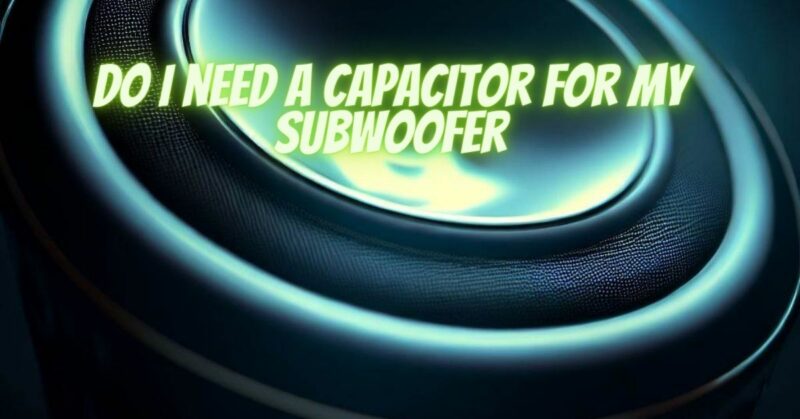Subwoofers are an integral part of audio systems, designed to reproduce low-frequency sounds and add depth and impact to your music or movie experience. When exploring subwoofer components, the question of whether you need a capacitor for your subwoofer might arise. Capacitors are electronic components used in various audio systems, but their application in subwoofers is specific and not universal. In this article, we will explore the role of capacitors in subwoofers, the different types of capacitors used, and whether you need one for your subwoofer.
The Role of Capacitors in Subwoofers:
In subwoofers, capacitors are primarily used for one specific purpose:
- High-Pass Filters: Capacitors are employed in subwoofers as part of high-pass filters. A high-pass filter allows only frequencies above a certain cutoff point to pass through while attenuating or blocking lower frequencies. In the context of subwoofers, high-pass filters prevent higher frequencies from being sent to the subwoofer driver, which can damage the driver and reduce the subwoofer’s efficiency.
Types of Capacitors Used in Subwoofers:
The capacitors used in subwoofers are typically of the non-polarized type and are rated to handle the power levels required by the subwoofer system. Polyester film capacitors are commonly used in subwoofer high-pass filters due to their stability and reliability.
Do You Need a Capacitor for Your Subwoofer?
The need for a capacitor in your subwoofer depends on the subwoofer’s design and the overall audio system configuration. Many subwoofers come with built-in high-pass filters and other protective circuitry that automatically prevent low-frequency signals from reaching the subwoofer driver. These built-in features ensure the subwoofer is protected from harmful signals, and you may not need to add an external capacitor.
However, if you are building a custom subwoofer system or modifying an existing one, you may need to consider adding a capacitor to implement a high-pass filter and protect your subwoofer driver. In such cases, it’s crucial to understand the subwoofer’s specifications, the amplifier’s power output, and the desired crossover frequency to choose the appropriate capacitor value.
In most cases, if you are using a commercially available subwoofer with built-in protective features, you likely don’t need to worry about adding an external capacitor. Manufacturers design subwoofers with proper protection circuitry to ensure the subwoofer operates safely and efficiently.
However, if you are designing a custom subwoofer system or modifying an existing one, capacitors can be valuable components to implement high-pass filters and protect your subwoofer driver. In such situations, it’s essential to have a good understanding of the subwoofer’s specifications and the amplifier’s power output to choose the appropriate capacitor value.
Always consider seeking the advice of an experienced audio technician or professional if you are unsure about modifying your subwoofer or audio system. Capacitors, when used correctly, can enhance the performance and longevity of your subwoofer, ensuring you enjoy powerful and rich bass that complements your overall audio experience.


